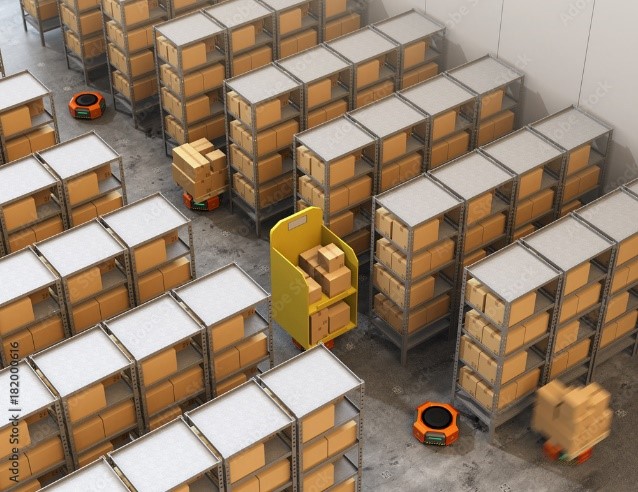
Life at the most basic level is all about progress and growth. The forward path through time is key to everything done from the moment we are born till the day we die. This forward growth is also key for businesses of all sorts engaged in B2C fulfillment and B2B fulfillment endeavors. It comes down to effective digitalization and automation approaches to fulfillment services. Working with B2C customers and B2B shipment clients is integral to the daily operations of shipping service providers today, but growth means that outsourcing is sometimes necessary. That’s where fulfillment-as-a-service (FaaS) has come into play.
FaaS is where companies partner with a third-party company or warehouse to prepare and ship B2C and B2B orders. This allows a company to tap into fulfillment partner capabilities with no upfront investment of capital, and only pay for services that are needed and actually utilized with global fulfillment.
For any business to grow and scale, it must find ways to improve and optimize, even at peak moments. This usually means businesses are looking for ways to gain a competitive advantage within their current market. A highly attractive way of gaining such competitive advantage is by outsourcing part of your activities that are highly resource intensive. This makes outsourcing fulfillment a great option to look at for many businesses that are looking to scale (Busby, 2019).
B2C Fulfillment Success: It’s All Analyze – Optimize – Grow
The main reasoning behind the attractiveness of outsourcing fulfillment is that the order fulfillment concept is broad and widespread. This essentially means that the number of areas of potential improvement is usually high. By outsourcing fulfillment and effectively acquiring ‘Fulfillment as a Service’ businesses can gain a strong competitive advantage within the e-commerce and global commerce markets. The well-known optimization process Analyze – Optimize – Grow, is highly applicable here. Companies that are looking to outsource their B2B fulfillment process and seek help with B2C fulfillment should follow these steps in order to do so effectively (Thill Inc., 2021). Here is what each of these steps looks like in fulfillment solutions and ecommerce fulfillment processes:
1. Analyze
As mentioned before, outsourcing Fulfillment is highly popular due to the main potential areas of improvement. In order to get the best results up front, a strong analysis has to be made that identifies key areas of improvement in the Fulfillment process. This, for instance, could mean a detailed lead time analysis, a performance courier report, a return efficiency overview, etc. Professional supply chain experts often provide their insight before working with their potential partners. This allows the cooperation to flow smoothly and allows expectations to be met. Once the key global fulfillment areas of fulfillment as a service improvement have been identified, the actual optimization commences.
2. Optimize
The optimization process of course changes depending on the area that requires CRM optimization. The main red line within the process is often the same. Professional fulfillment experts that hold up-to-date knowledge of the current fulfillment innovations are often very able to implement disruptive measures to drastically improve the Fulfillment process for businesses. The best fulfillment companies make use of the most innovative technologies such as IoT (Internet of things) e.g., temperature sensors for Cargo loads, AGV (Automated Guided Vehicles) to maximize warehouse efficiency. Common but effective measures are also often implemented such as a more effective returns process, or the implementation of a ‘same-day delivery fulfillment’ option.
3. Grow
The most important indicator of successfully outsourcing your fulfillment process is of course continuous and stable growth. Outsourcing your fulfillment process should effectively reduce your resource utilization rate and improve the efficiency of your overall business as you are able to focus on other internal aspects. Evaluating periodically will result in a better partnership and will ensure that expectations are met accordingly. An important thing to keep in mind is that knowledge and insight of professional fulfillment companies should always be considered. A small ‘bump in the road’ can often be overcome by staying with the partner in question and keeping the partnership alive.

Key Benefits of Successful FaaS
There are plenty of benefits that come with outsourcing your fulfillment services. One of the greatest is the far-reaching impact supply chain tools have on the industry.
A couple of additional benefits of a global fulfillment approach to fulfillment as a service are mentioned below.
- Cash flow optimization – Handling fulfillment services internally can potentially require a high investment cost. Warehouses need to be rented, customer service staff must be hired, trucks and other moving vehicles have to be purchased etc. Making use of a fulfillment provider essentially turns these fixed costs into variable costs as the costs often scale with products/sales moving through the Supply Chain. Making use of a fulfillment provider can often impact your cash flow substantially by increasing the cash in hand and reducing fixed costs.
- Tap into new markets – Looking for competitive advantage will always be a key element that businesses decide to focus on as it yields them the opportunity to outpace competition. The cycle is simple yet highly effective. Fulfillment as a service increases your resource effectiveness by reducing resource intensiveness, in turn allowing you to allocate your resource in a different manner. This opens up doors to diversify by tapping into new markets that provide you new prospects.
- Expertise results in lower costs – Costs are almost always going to decrease when making use of a professional Fulfillment service provider. This has many reasons behind it. An example would be bulk transport contracting. Some Fulfillment experts make use of their connections which yields them cheaper transportation fares due to bulk consolidation with other loads/companies. In the Transportation sector, volume often means cheaper pricing per kg. Professional fulfillment companies often know exactly how to leverage this concept which results in cheaper transportation prices overall, thus reducing your costs.
Maximize Global Fulfillment With ModusLink
When businesses need help with fulfillment services, whether that is B2B fulfillment or B2C fulfillment, taking an ‘as a service approach is proving to be effective. With current levels of demand and customer impacts, industry leaders need to partner with a service provider who understands the market trends and consumer demands. Supply chain party logistics concerning B2B and B2C orders is easier with expert insight and guidance. Contact ModusLink today to learn more about customer expectations and B2B fulfillment services from start to finish.
Bibliography
Busby, A. (2019, 24 oktober). Fulfillment As A Service, Why The Future Of Delivery Is In The Clouds. Forbes. Geraadpleegd op 26 februari 2022, van https://www.forbes.com/sites/andrewbusby/2019/10/23/fulfillment-as-a-service-why-the-future-of-delivery-is-in-the-cloud/?sh=6b83309d4af1
business.com editorial staff. (2014, 25 juni). Benefits of Using an Order Fulfillment Service. Business.Com. Geraadpleegd op 2 maart 2022, van https://www.business.com/articles/benefits-of-using-an-order-fulfillment-service/
Roggio, A. (2011, 4 november). 5 Reasons to Consider Fulfillment Services. Practical Ecommerce. Geraadpleegd op 5 maart 2022, van https://www.practicalecommerce.com/5-Reasons-to-Consider-Fulfillment-Services
Thill Inc. (2021, 21 oktober). Fulfillment Center Pros & Cons. Thill Inc. Geraadpleegd op 5 maart 2022, van https://thillinc.com/blog/fulfillment-center-pros-cons/